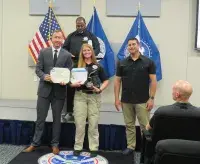 Louis Armstrong New Orleans International Airport (MSY) Canine Handler Jessica Montgomery and her partner Loki search for explosives. (Photo courtesy of TSA MSY)
Louis Armstrong New Orleans International Airport (MSY) Canine Handler Jessica Montgomery and her partner Loki search for explosives. (Photo courtesy of TSA MSY)
Don’t we all want to be the “top dog?” Jessica Montgomery can proudly say she’s TSA’s top dog handler.
Montgomery, a new explosive detection canine handler from Louis Armstrong New Orleans International Airport (MSY), was named “Top Dog” Handler in her class at the TSA Canine Training Center (CTC) in San Antonio. The CTC presents the award at the end of each 16-week basic training session.
“I was definitely surprised and quite appreciative,” said Montgomery. “It meant a lot coming from my instructors.”
Montgomery started her TSA career as a screening officer from 2014 to 2016, and after a five-year hiatus, TSA rehired her into the canine program in October 2021. A Labrador retriever named Loki became her partner earlier this year when they attended canine training school together.
“Jessica’s accomplishment is a direct reflection of her hard work and dedication,” MSY Lead Explosive Detection Canine Handler Benjamin Vidacovich noted. “I look forward to working alongside her and continuing to push her to achieve more.”
Vidacovich said MSY’s canine team is vital to security and protecting the public at the airport and is an additional layer of security that can’t be replaced.
In addition to the “Top Dog” Handler Award, the CTC also presents a “Distinguished Honor Graduate” Award to the handler who displays outstanding academic achievement during basic training.
“A well-trained canine team is an unmatched tool and a critical part of TSA’s layered security approach,” said CTC Director Zebulon Polasek. “TSA canine teams are not only a force multiplier, but are able to detect explosives better than any current modern technology.”
Polasek said professional canine handlers have one of the most fulfilling and rewarding jobs at TSA; however, it’s not without sacrifice and is a lot of hard work. He said the 80-day canine basic training is just the start to a challenging career.
“Every canine is unique with their own set of challenges, but once that lifelong bond is established and the canine and handler become a team, nothing is more satisfying,” Polasek said. “The job is 24/7 as the canine comes home with the handler every day and becomes a member of the family.”
Montgomery couldn’t agree more, saying Loki loves working around the clock and she’s in awe of what Loki and the other dogs are capable of doing.
“It’s important for us to rely on each other,” she emphasized. “Loki smells 10,000 times more than I can, although I can assist him with things he may not see or reach.”
In assessing Loki’s progress, Montgomery’s canine instructors cited her positive attitude and calm temperament with her new canine.
“With the chaos on the job, it’s important to remain calm because the canine is known to feel or exert what I feel. Therefore, remaining calm keeps Loki in search mode and able to adhere to his duties.”
She describes Loki, though, as fun to work with. Loki celebrated his second birthday on June 10.
“It’s an honor and privilege for me to work alongside such a great canine team,” said MSY TSA Deputy Assistant Federal Security Director-Screening Brad Meyer. “I look forward to their work in the field, knowing the traveling public will be that much safer with the screening Jessica and Loki will provide.”
The TSA Canine Training Center not only trains new TSA dogs but also teams up with law enforcement canine teams. The center expects to train 136 law enforcement dogs this year, partnering with 90 police agencies across the country.
For those interested in a new career experience, Polasek encourages others to consider applying for TSA’s canine program.
“If you love dogs and are willing to commit yourself to this type of career, there is, in my professional opinion, no better job at TSA,” said Polasek.
By Don Wagner, TSA Strategic Communications & Public Affairs


